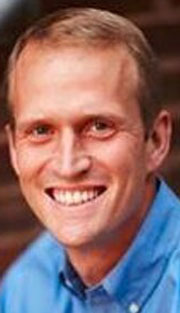Today we hear from Peter Greer and Chris Horst. Greer is president and CEO of HOPE International. Horst is the vice president of development at HOPE International. Together with the support of Anna Haggard, they coauthored Mission Drift and Entrepreneurship for Human Flourishing. We talked about what it means to stay focused on the mission God has for you and how easy it can be to drift away.

1) As an organization, you faced a crossroads at one point where you were forced to choose between a large donor and your core values. You ultimately chose to reject the funds and stay true to yourmission, but it was not without some serious soul-searching. What ultimately lead to your decision?
Several years ago, a large foundation offered us an ultimatum: We’ll fund you if you tone down the “Christian stuff.”
Cash-strapped, we really wanted to make this work, but this was when we began actively researching "drift." Ultimately, we decided to turn down the funds because we began to recognize how small decisions—when compounded over time—lead to "mission drift." We might have figured out a way to broker a deal with the donor while still protecting our core identity, but concluded this situation had real potential to pull us away from our full mission.
Researching mission drift, we discovered how we already had opened the door to drift through our hiring practices, and metrics, among other decisions.
2) Nonprofit organizations, especially evangelical ones, are constantly facing these kinds of decisions. You say in Mission Drift that it is not necessarily what happens in that moment of decision but a series of decisions and systems leading up to that moment that decide if a organization will stay true. Can you explain?
One hypothesis in Mission Drift is that small decisions matter. In physics, a theory for drift exists. The second law of thermodynamics states that in the natural order of the universe, things degenerate, rather than come together. For example, when a frying pan is taken off the stove, the energy of heat will diffuse in the air, leaving the pan cooler. Unless more energy is added—someone puts the frying pan back on the stove—it will lose its heat and return to room temperature.
We found that to be the norm within organizations, businesses, and in people’s personal lives. Particularly with parachurch organizations, walking the line of being faithfully, distinctively Christian is a daily challenge. If you are not intentional about small decisions, you will experience drift.

3) It seems some organizations stay on course long after their founder is dead, while others begin the eventual drift from their original mission. What keeps an organization on track for the long haul?
One of Harvard’s founding documents states: “To … consider well that the main end of your life and studies is to know God and Jesus Christ.” At one time, Harvard’s purpose was to equip their students to share the gospel. We’re not here to challenge what Harvard is today. We’re here to contend with what Harvard is not.
Here’s the reality: mission drift is the natural course for organizations. Though pervasive, mission drift is not inevitable. Along our journey we have discovered several organizations—like Compassion, InterVarsity, Cru, among others—staying "mission true." What sets mission true organizations apart? First, we discovered that mission true organizations believe that mission drift will happen unless they safeguard against it. Even more important, they believe that a Christ-centered identity is worth protecting.
4) Some organizations stay true to their values, but ultimately become ineffective and irrelevant. How do healthy organizations marry principle and performance?
Mission true organizations understand how to distinguish their mission from their means. Consider the contrast between one organization that drifted from its original mission to one that stayed mission true. A man named George Williams started a Bible study in 1844 for displaced young men on the streets of London. These Bible studies became a movement known as the Young Man’s Christian Association (YMCA). But along the way, the YMCA substituted its mission—to share the Gospel—for one of its means: fitness centers. We love the YMCA, both the song and the fitness center, but in many communities where the Y works in the United States, it no longer has the same mission.
Contrast that with Young Life. In the early days Young Life ministered to high school students with evangelistic barbershop quartets. Men in pinstripes singing in four-part harmony wouldn’t capture the imaginations of today’s teenagers. Instead Young Life has taken to cell phones and social media. But they haven’t forgotten why they exist: today they still proclaim Christ to students. Though their means have changed, they continue to remain faithful to their core purpose.
If you are not intentional about small decisions in your personal goals, marriage, and business, you will experience drift.
5) If you could give Christian leaders one piece of advice as they lead their organizations in the 21st century, what would that be?
Today, Christians recognize the importance of Good Samaritanism—there’s been a rise of those advocating for justice, poverty alleviation, and education. But have we forgotten that our most precious asset is the gospel message, one that brings reconciliation, hope, and redemption?
We must not forget that we are not just world-class humanitarians or educators or urban ministers or philanthropists or business leaders, but we are Christians. We must do good, but we must not forget we have good news to share. Unless we proactively integrate this conviction into the practices, policies and operations of our organizations, it will slowly and assuredly fade.
To better assess the prevalence of drift and what keeps organizations mission true, we have created the Mission Drift Survey (available here), which faith-based organizations can take to better understand their susceptibility to drift.
Daniel Darling is vice-president of communications for the Ethics and Religious Liberty Commission. He is the author of several books, including his latest, Activist Faith.











